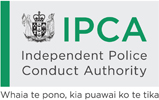Role and powers
The Authority has the following functions and powers under the Independent Police Conduct Authority Act 1988.
Functions
Under section 12 of the Independent Police Conduct Authority Act 1988, the Authority’s functions are to:
- receive complaints (i) alleging misconduct or neglect of duty by any member of Police or (ii) concerning any Police practice, policy or procedure affecting a complainant; or
- investigate incidents in which a member of Police (acting in the execution of his or her duty) causes or appears to have caused death or serious bodily harm.
Action on complaints
Under the Act, when the Authority receives a complaint, it may carry out its own investigation, or refer the matter to the Police for investigation under the Authority’s oversight.
If a complaint is referred to the Police for investigation, the Authority will take steps to ensure that it is properly resolved. This may include directing or actively overseeing the Police investigation, or reviewing or auditing the Police investigation once it is completed.
The Authority may also decline to take action on a complaint – for example, if the complaint is very minor or outside the Authority’s jurisdiction.
The Authority’s powers in relation to complaints are set out in section 17 and section 19 of the Act.
Notification of the Police
Under the Independent Police Conduct Authority Act 1988, when the Authority receives a complaint about Police it is required to notify the Police.
Likewise, when the Police receive complaints, they are required to notify the Authority within five working days. They are also required to notify the Authority of any incident in which Police staff, acting in the execution of their duty, cause or appear to have caused death or serious bodily harm.
Powers
The Authority has the same powers as a Commission of Inquiry to summon witnesses and gather evidence (sections 23-26 of the Act).
Police are required to provide all information and assistance needed for the Authority to carry out its functions.
Once an investigation is completed, the Authority must determine whether any Police act or omission was contrary to law, unreasonable, unjustified, unfair, or undesirable (sections 27 and 28).
The Authority must inform the Police of its findings, and can make recommendations, which may include that disciplinary or criminal proceedings be considered or instituted. The Authority cannot itself lay charges or take disciplinary action (section 27).
If the Authority is not satisfied with the Police response to its recommendations, the Authority must inform the Attorney-General and the Minister of Police. The Attorney-General must in turn inform Parliament (section 29).
The Authority can release public reports on its investigations, in the public interest or in the interests of any person (section 34).


